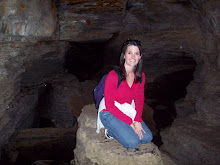Ok...for our MAPping activity, I chose the site about California's velcro crop. I realized from the start that this was a bogus site, but I clicked on it anyway to get a good chuckle. I have to say, I have never had any training that I can recall where I was taught about ways to verify the source of something I find on the Web, so this activity was rather enlightening.
I am thrilled to feel like I am now armed with some "weapons of Web debunktion". I was aware of the fact that if a web address includes a ~ followed by a name, that was an indicator that the site was a personal one and not necessarily unbiased, but that's about all. I was thrilled to learn about the tool at http://www.altavista.com/ where you can type in the URL of a site preceded by the word link: to find out which sites have been externally linked to the site in question. Had I not already realized that the site about California's velcro crop was satirical, I would have been able to figure it out just by using this tool. I was able to see that the sites that were externally linked to the velcro site were either citing the URL as one that is bogus and non-factual or using the site as an example in a lesson about evaluating web content.
Determining the author or publisher of a site is crucial, especially when you are in charge of teaching youngsters about surfing the web. I attended a workshop where the keynote speaker, David Warlick, used the same Martin Luther King, Jr. web site that Alan November used as an example of the importance of determining who is supporting the information we find on a web site. At this workshop, Warlick showed us how to determine who was authoring the information found in the MLK site, and a collective gasp escaped the crowd as we realized it was backed by a white supremacy group. To think that students might be reading this type of slander while researching Dr. King is astounding. Easywhois.com is a fabulous tool that I was also unaware of prior to this activity, but its value is huge! By simply entering the domain name of a site into the search box, you can easily learn more about the author/publisher of a site.
When searching the Web in the future, I plan to use easywhois.com and altavista.com periodically to help me remember thess features until I get back in the classroom and to check out the validity of some unknown sites I might visit in the future. I feel fairly confident about the sources I have used in the past for research, both personal and academic, but it would have been nice to know there are free tools available to help me make sure I don't quote bad information. I will be sure to keep these things in mind as I continue my Master's courses. That being said, it is so important for teachers to empower their students with the tools necessary to weed out information found on the Web so as not to be misinformed. Most of the sites like the MLK site backed by Stormfront that are strongly biased and provide false information and bold untruths are blocked by the filters in the school network, but these filters do not follow students home when they search the Internet from their home computers. If teachers do not teach students how to access the tools that will help them determine the author of a site or see how other sites have linked to a particular site, how will the students be able to determine which information is valid and which is false?
Finally, organizing information through tools such as Delicious is wonderful because it allows me to bookmark any useful sites that I might find so that they are accessible to me no matter where I am. I love the 'Favorites" feature of my computer because I don't have to type in the address for TAMU-Commerce each time I want to log in to my classes, but when I am away from my home computer, the log-in process takes me a bit longer because I have to start from the TAMU-C homepage...a small step but an inconvenience just the same. The bookmarks I've made in Delicious are things I think might come in handy when I go back to teaching, and the chance that I will remember even a handful of those web addresses by the time that happens is slim to nil, so thank you, Delicious.com.
Subscribe to:
Post Comments (Atom)

No comments:
Post a Comment